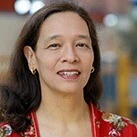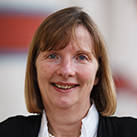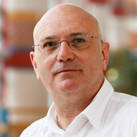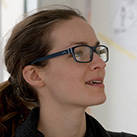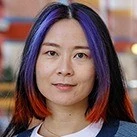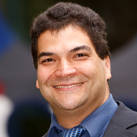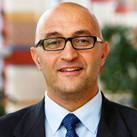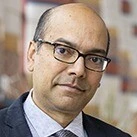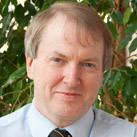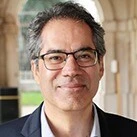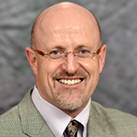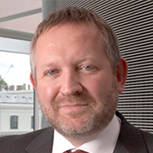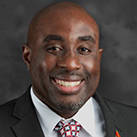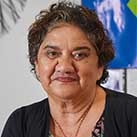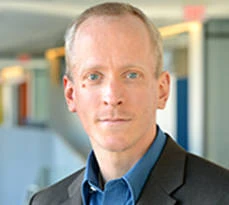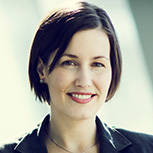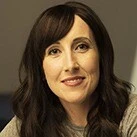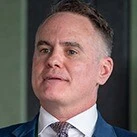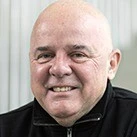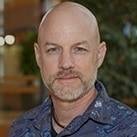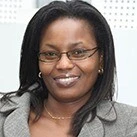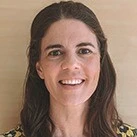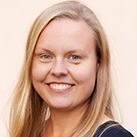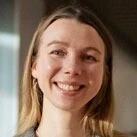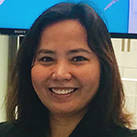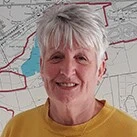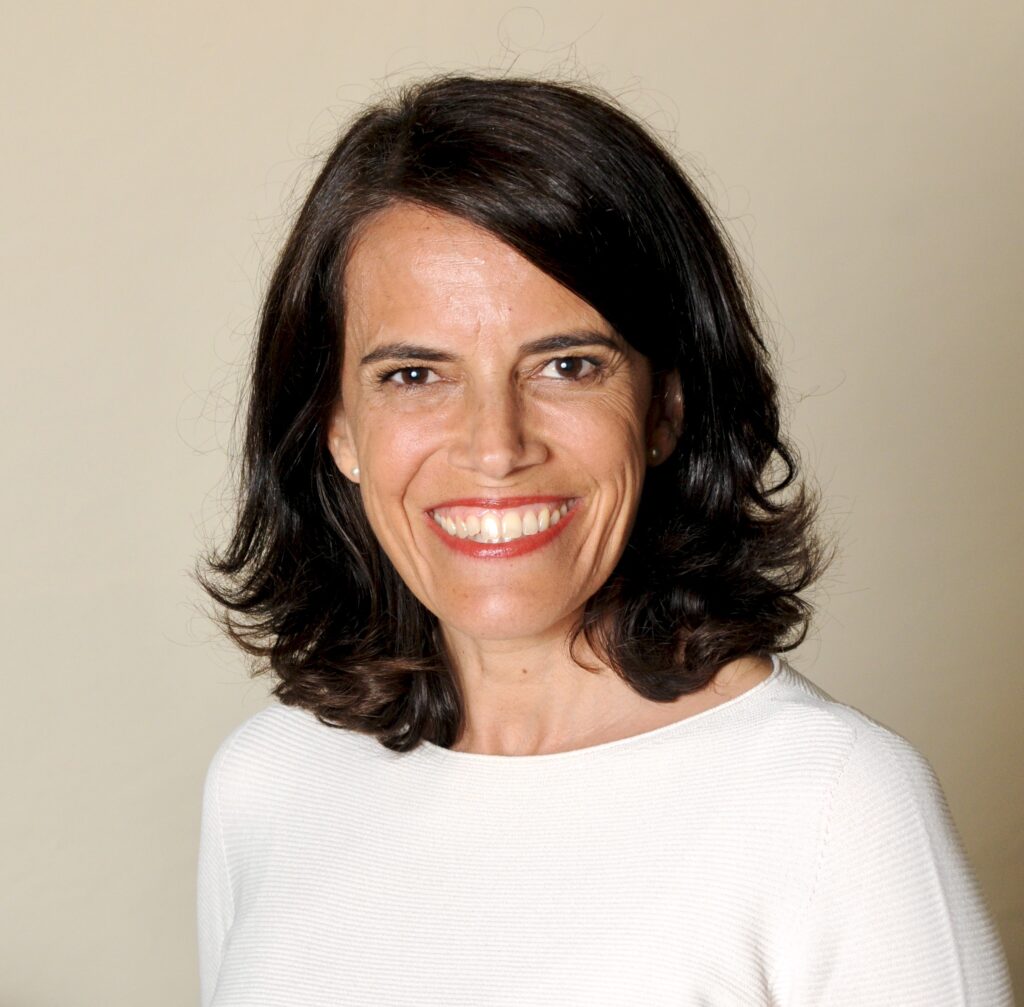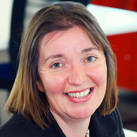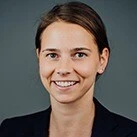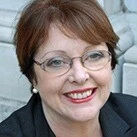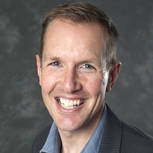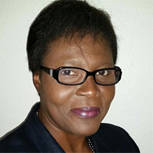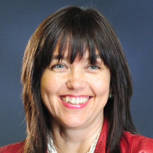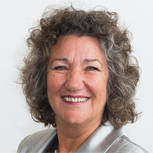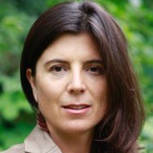The Centre team (Professor Paul Tracey, Professor Neil Stott and Dr Helen Haugh) works closely with Cambridge Judge faculty, research fellows and practitioner honorary fellows to develop cutting edge research, learning and support.
Many other social innovators, volunteers and students contribute to the work of the Centre.
Centre staff
Paul Tracey
Co-Director
Professor of Innovation and Organisation
Professor Tracey’s research is concerned with the distinctive management challenges of leading social purpose organisations that generate their income through market-based activity. An ethnographer by training, between 2010 and 2012 he held an Economic and Social Research Council Mid-career Fellowship, during which he conducted an in-depth participant observation study of a leading social enterprise. The study focused on how community-based organisations may become stigmatised for helping “unwelcome” parts of the community, and the implications for organisational outcomes.
Nicole Helwig
Executive Director, Cambridge Centre for Social Innovation
DProf (Middlesex University)
Dr Nicole Helwig is Executive Director of the Cambridge Centre for Social Innovation. Prior to joining the centre, Nicole was an Honorary Practice Fellow, engaging with students in the MSt in Social Innovation.
Nicole works extensively with social ventures and social entrepreneurs as head of Cambridge Social Ventures. Earlier in her career she was founding manager of the Centre for Social Enterprise at Memorial University of Newfoundland, Canada where she also acted as programme co-ordinator for an MBA in social enterprise and entrepreneurship. She is an Adjunct Professor at Taylor’s University School of Liberal Arts and Sciences, Kuala Lumpur, Malaysia.
Nicole holds a Doctor of Professional Studies by Public Works from Middlesex University, an MBA from the University of Strathclyde (Malaysian international centre) and a BA from McGill University (humanistic studies programme). Nicole also holds a classical ballet pedagogue diploma from the Hungarian Dance Academy.
Helen Haugh
Research Director
Associate Professor in Community Enterprise
Dr Haugh has written extensively on the topic of social entrepreneurship. A particular focus of her work is community-based enterprise, and more specifically the role of communities in creating sustainable solutions to social problems. In 2008 she established the Tata International Social Entrepreneurship Scheme, which offers final year undergraduate or postgraduate students at the University of Cambridge the opportunity to work on social entrepreneurship and corporate social responsibility projects within the Tata Group of Companies in India.
Soussan Shahriari
Business Development and Programme Manager, MSt in Social Innovation
Soussan manages the admissions for the MSt in Social innovation. She is responsible for business development for the programme and co-ordinates the delivery of the online and offline elements of the masters. Soussan joined the Business School from Central Admissions at the University and has worked across various department within the University offering support to a wide range of graduate students.
Leonore Lord
Business Advisor, Cambridge Social Ventures
Leonore is a business coach, work psychologist and trainer; she has 20 years of experience working with commercial SMEs and social enterprises, from tattooists to consultants, mainly during their early startup stages.
Her career includes working in the third sector on both UK and International enterprise programmes as a Project manager and as a Business Coach.
Outside of her work with Cambridge Social Ventures, she offers business coaching to a wide range of diverse entrepreneurs; specialisms include working with people with multiple barriers, including those who may have mental and physical disabilities.
Neil Stott
Co-Director
Management Practice Professor of Social Innovation and Director of the Master in Social Innovation
Professor Stott has studied social innovation in poor places and the role of entrepreneurial third sector organisations. He was Chief Executive of Keystone Development Trust from 2003-2015, one of the largest development trusts in the country, delivering community development, social enterprises and property development.
Previously Neil was Head of Community Development at Canterbury City Council, Principal Officer (Community) at Cambridge City Council as well as work for charities such as Mencap, Contact-a-Family and Elfrida Rathbone Society.
Michelle Fava Darlington
Head of Learning Design and Content Development
Junior Research Fellow, Cambridge School of Art; Co-founder, Thinking Through Drawing
Dr Michelle Fava holds a PhD in drawing and cognitive psychology from University of Loughborough (2014). Her work applies cognitive principles to education, facilitation and research methods. She has written and edited academic publications on drawing, visual literacy arts integration, and social innovation.
She is co-founder of the Thinking Through Drawing project, a research network and professional development provider that focuses on creativity and visual literacy in education and research.
Michelle’s present research with the Cambridge Centre for Social Innovation is looking into the factors influencing the longevity of Community Economic Development Organisations in the UK, and their roles within cross-sector partnerships.
Heather Mackay
Programme Coordinator, MSt in Social Innovation
Heather works on promotion and communications for the MSt in Social Innovation, and works alongside the Programme Manager on logistics for the offline and online elements of the programme. Prior to joining Cambridge Judge Business School, Heather worked in academic marketing and communications for Cambridge University Press, with responsibility for promoting law books.
Linzhi Zhang
Teaching Associate, MSt in Social Innovation
PhD (University of Cambridge)
Dave Sheridan
Business Advisor, Cambridge Social Ventures
Dave Sheridan has over 30 years’ experience in Teaching, Training, Personal Development, Mentoring, Project Management and Business Growth Development. He has a varied portfolio of work in public, private, sport, charities, community organisations, the Home Office, Ministry of Justice and international companies.
His early experience in community settings, and later on in further education, fuelled his enthusiasm for personal development, and he regularly sees potential where others do not.
His focus is now on the development, management and delivery of bespoke projects, courses and programmes which challenge, motivate and inspire people to make positive changes in their professional and personal lives. Project areas he covers include lifestyle management, growth mindset, understanding relationships and positive impact.
His current clients include business owners, multi-national private sector companies, charities, and at-risk groups through his community interest company including those living with homelessness, disability, unemployment, social isolation, addiction, domestic violence and more. He is also involved with the training and development of elite sports leaders, teams and individuals.
Dave’s creativity and eagerness to collaborate has allowed him to build strong partnerships which genuinely succeed. These partnerships enable him to develop unique projects, with themes and topics which are relevant, timely and delivered in suitable environments, from boardroom to pitch-side and everywhere in between.
Affiliated faculty
Michael Barrett
Professor of Information Systems & Innovation Studies
PhD (University of Cambridge)
Shahzad (Shaz) Ansari
Professor of Strategy and Innovation
PhD (University of Cambridge)
Simon Stockley
Senior Teaching Faculty in Entrepreneurship
BSc, MBA (Aston University)
Khaled Soufani
Management Practice Professor of Financial Economics and Policy
PhD (University of Nottingham)
Jaideep Prabhu
Professor of Marketing
Jawaharlal Nehru Professor of Indian Business & Enterprise
PhD (University of Southern California)
Philip Stiles
Associate Professor in Corporate Governance
PhD (University of London)
Dr Philip Stiles is a tenured faculty member at the Judge Business School, University of Cambridge and Director of the Centre for International Human Resource Management.
He has worked at the University of Cambridge for 25 years. He previously worked at London Business School.
He has written 3 books, the most recent of which is “Board Dynamics” published by Cambridge University Press in 2022.
Philip’s principal research area is in board dynamics, people management, leadership, and culture. He has researched with major organisations, including developing a research consortium of companies worldwide – including American Express, BT, EDF, GE, General Mills, Glaxo-SmithKline, IBM, IKEA, Infosys, Matsushita, Oracle, Procter and Gamble, Rolls-Royce, SANYO, Sealed Air, Shell, Siemens, TCL, TNT, and Unilever. This research is focused on the linkages between leadership, culture, and innovation.
Most recently he has worked on a major piece of research, funded by the UK Government to $5 million, on the future of work and technology.
He consults to several organisations in both the private and public sector and is on the advisory board of a start-up organisation in London. He conducts board reviews for a number of organisations.
His executive education work has involved working with a wide range of firms from around the world, from professional service firms in law, accountancy, management consulting and advertising, to corporations such as Barclays, IBM, BT, HSBC, non-profits such as Nature Conservancy, NHS, and UNICEF and scientific organisations such as the Sanger Centre in Cambridge, as well as many start-ups and sports teams.
He teaches 2 core courses on the MBA – Organisational Behaviour and Corporate Governance and he teaches Corporate Governance on the Executive MBA He also teaches Corporate Governance on the Master of Accounting course.
Philip has won several awards for research and teaching, including the University of Cambridge Pilkington prize for Teaching Excellence and teacher of the year for the MBA.
He has also won an IBM faculty award for his work with IBM in the area of Services Science.
He is a board advisor to 2 companies, both start-ups, in the Cambridge area.
Kamal Munir
Professor of Strategy and Policy
PhD (McGill University)
Jennifer Howard-Grenville
Diageo Professor in Organisation Studies
PhD (Massachusetts Institute of Technology)
Research fellows
Prathivadi B Anand
Professor-Public Policy & Sustainability, University of Bradford
Professor PB Anand is Professor of Public Policy and Sustainable Development at the Department of Peace Studies and International Development at the University of Bradford. His research interests include: human development and the capability approach; environmental and corporate governance; sustainable cities; ethics of smart technologies for advancing capabilities. He has board level experience on 2 learned societies, a university, a community grammar school and a charity. He is very keen on leadership development within social enterprises and public and non-profit sector organisations.
Douglas Creed
Professor of Management, College of Business, University of Rhode Island
Professor Doug Creed is a Professor of Management at the College of Business, University of Rhode Island. Most of his research has looked at issues of workplace diversity and organisational change processes for greater inclusion and equity. In the late 1990s, he conducted groundbreaking research on lesbian, gay, bisexual and transgender (LGBT) work place and career experience and employee grassroots efforts to end workplace inequities based on sexual orientation and gender identity. He received his PhD and MBA from the University of California, Berkeley. He has a MA in Religion from Yale Divinity School and a BA, Magna Cum Laude, with Distinction in English, from Yale College.
Moritz Gruban
Lecturer in Organisation Studies at Royal Holloway, University of London
Moritz Gruban is as a Lecturer in Organisation Studies at Royal Holloway, University of London. He holds a PhD in Management from the University of Lausanne and was a Swiss National Science Foundation Postdoctoral Fellow at the Cambridge Judge Business School. He was also a Research Associate at Lucy Cavendish College.
Moritz’s research interests include social evaluations of organisations (in particular legitimacy, stigma and trust), organisational misconduct and greenwashing.
Currently, Moritz is involved in several research projects focusing on the legitimation of morally questionable organisational practices, the behavioural implications of legitimacy judgments, and how individuals deal with stigmatised identities.
Moritz teaches organisation studies, human resource management, and research methods.
Nelson Philips
Professor of Technology Management, College of Engineering, University of California, Santa Barbara
Nelson Phillips is Professor of Technology Management in the College of Engineering at the University of California, Santa Barbara (UCSB). Originally from Canada, he holds a BSc in electrical engineering and an MBA from the University of Calgary, as well as a PhD in Organisational Analysis from the University of Alberta. Prior to joining UCSB, Professor Phillips was Professor of Innovation and Strategy at Imperial College Business School in London, UK where he was also the Associate Dean of External Relations and the Co-director of the Centre for Responsible Leadership. He was also the Beckwith Professor of Management Studies at Cambridge Judge Business School, University of Cambridge, from 2001 to 2005, and a faculty member in the Faculty of Management, McGill University from 1993 to 2001. He is currently the Co-editor of Innovation: Management and Organization, sits on the board of governors of the Academy of Management, and is on the advisory board of the Society for the Advancement of Management Studies.
Professor Phillips’ research interests cut across organisation theory, innovation and technology, and he has published widely for both academics and practitioners including papers in AMJ, AMR, Annals, Organization Science, Harvard Business Review and the Sloan Management Review. He has also written six books including Discourse Analysis (with Cynthia Hardy) and Constructing Organizational Life (with Tom Lawrence). He is currently working on a book on qualitative methods in organisational research to be published by Cambridge University Press and a book on linguistic methods in management research that will be published by Sage.
Leon Prieto
Professor of Management & the Director of the Center for Social Innovation & Sustainable Entrepreneurship in the College of Business at Clayton State University
Leon C. Prieto is a Professor of Management & the Director of the Center for Social Innovation & Sustainable Entrepreneurship in the College of Business at Clayton State University. He has published articles in respected academic and practitioner journals such as Academy of Management Learning & Education, Journal of Business Ethics, Journal of Management History, Harvard Business Review, and MIT Sloan Review. His first book (co-authored with Dr Simone Phipps) is entitled African American Management History: Insights on Gaining a Cooperative Advantage.
His scholarship has received recognition from Thinkers50, the Academy of Management, the ThinkList (University of Bath’s Center for Business, Organisations and Society), and the United States Association for Small Business & Entrepreneurship. He holds a PhD in Human Resource and Leadership Development from Louisiana State University, a Master of Liberal Arts in Extension Studies, concentration in History & Social Justice from Harvard University, an Executive Certificate in Leading Sustainable Corporations from Oxford University, an MBA from Georgia Southern University, and a BSc in Management from Claflin University.
Wendy Smith
Professor of Management, Alfred Lerner School of Business, University of Delaware
Wendy Smith earned her PhD in Organisational Behaviour at Harvard Business School, and is currently a professor of management and Co-director of the Women’s Leadership Initiative at the Alfred Lerner School of Business at the University of Delaware.
Her research explores how leaders and their organisations address strategic paradoxes – contradictory, yet interrelated demands embedded in an organisation’s strategy. She has investigated how organisations manage to achieve social and financial performance, explore new opportunities and exploit existing competencies, or enable short term and long term success. Her current research investigates how social entrepreneurs create conditions to sustain both their social mission and business purpose. Her research has been published in journals such as Academy of Management Review, Academy of Management Journal, Harvard Business Review, and Organization Science. Wendy also serves as an editorial board member for Academy of Management Review, Academy of Management Journal and Business Ethics Quarterly.
Wendy teaches leadership, organisational behaviour and business ethics. She has taught MBAs and undergraduates at University of Delaware, Harvard, and University of Pennsylvania – Wharton. She was nominated for the MBA Teacher Award at the Lerner Business School each year from 2007-2014 and nominated for the University of Delaware Excellence in Teaching Award in 2008, 2009, 2012 and 2013. She has taught leadership to executives.
Wendy lives in Philadelphia with her husband and three children.
Ella Henry
Professor, Auckland University of Technology
Director of Māori Advancement, Auckland University of Technology
Ella Henry is a New Zealand Māori woman with tribal affiliations to the Far North region. Ella holds a Master of Philosophy, which focused on Māori women and leadership; and a PhD which focused on Māori entrepreneurship in screen production.
In 2022, Ella was appointed a professor of entrepreneurship in the School of Business Economics & Law, Auckland University of Technology. Ella is also the Director of Māori Advancement for the Business School. Her role is to enhance the participation and success of Māori students and scholars.
She has worked extensively with her own tribe, as a Negotiator for their Treaty of Waitangi Claim, and as Chair of the Post-Settlement Governance Entity. Alongside work with her own and other tribal organisations, Ella has also been involved with the Māori screen industry, helping to develop capability and training within, and advocating for, an authentic Indigenous voice in and across screen production.
In August 2023, Ella, as part of a group of Indigenous business scholars, is launching the International Academy of Research in Indigenous Management and Organization, with an inaugural consortium at Telfer School of Management, Ottawa, hosted by the Canada Research Chair in Social and Inclusive Entrepreneurship, Professor Ana Maria Peredo.
Simon Bell
Professor of Marketing and Director of Executive Education, University of Melbourne
Professor Simon Bell is Head of School of MSPACE, the University of Melbourne’s School of Professional and Continuing Education. Simon is also a professor of marketing in the Faculty of Business & Economics. He studies how firms can become more effective organisations by engaging with customers more meaningfully. He focuses on how frontline employees interact with customers to create value for the customer, the firm, and themselves. He also studies how regional clusters can sustain performance of individual firms and create conditions for innovation. Behind all his research is the idea that by recasting how firms connect with others, whether that is their customers, staff, or other firms, they can improve their performance.
Simon has worked extensively with industry in a research, consulting, and executive education capacity. He has delivered executive education courses for the University of Cambridge and Duke Corporate Education. He has conducted research projects with a range of organisations including Goldman Sachs, Target, PWC, and Safer Care Victoria. He sits on the editorial boards of the Journal of Marketing and the Journal of Service Research and is a Fellow of the Australian Marketing Institute (FAMI).
Tina Dacin
Stephen J.R. Smith Chaired Professor of Strategy & Organizations, Smith School of Business, Queen’s University
Tina Dacin is the Stephen J.R. Smith Chaired Professor of Strategy and Organizational Behavior and a Scotiabank Scholar in the Smith School of Business. She is the Principal Investigator of the Community Revitalization Research Program at the Smith School of Business. Tina’s current teaching is in the areas of AI, bias and ethics, community resilience, social impact and inclusive leadership. Tina is former Chair of the Principal’s Innovation Fund at Queen’s University and former Director of the Centre for Social Impact at the Smith School of Business.
Tina’s research has been published in leading management journals and she has served in a variety of editorial positions for these journals. Tina received her doctorate from the University of Toronto and prior to joining Queen’s University, she spent nine years at Texas A & M University. She is currently a Visiting Fellow at Cambridge Judge Business School at the University of Cambridge, a Visiting Professorial Fellow at the University of Melbourne and the Winspear Scholar at the University of Victoria. Tina has served on the Advisory Boards of the Community Foundation for Kingston, PRME Champion and Advisory Council Member, UN PRME, Board of Trustees member of the Globally Responsible Leadership Initiative Foundation (GRLI).
Wesley Helms
Associate Professor of Strategic Management, Brock University’s Goodman School of Business
Wesley S. Helms is an Associate Professor of Strategic Management at Brock University’s Goodman School of Business. Wes received his PhD from the Schulich School of Business at York University. His research has focused on understanding how “marginalised” organisational actors, rather than being powerless, negotiate, compete, and manage conflict with competitors and sanctioning audiences in order to influence their social contexts.
Specifically, he has examined how marginalised actors negotiated and shaped the meaning of corporate social responsibility (CSR), how mixed martial artists used the stigmatising labels that discredited them to garner broader social acceptance, and, most recently, how social enterprises compete with, and contest, new market entrants to control the meaning of social entrepreneurship.
Based upon his research, teaching, and consulting with social enterprises in Ontario, North America, and internationally he was recently named the Goodman Social Innovation Research Scholar at Brock University.
Simone Phipps
Professor of Management in the School of Business, Middle Georgia State University
Simone T. A. Phipps, PhD, is a Professor of Management in the School of Business at Middle Georgia State University (MGA), where she teaches organisational behaviour, entrepreneurship, principles of management, strategic management, human resource management, and leadership. She is the winner of the 2021 MGA ‘Excellence in Scholarship Award’. She is also a member of the Thinkers50 ‘Radar Class’ of 2021, a winner of the Thinkers50 ‘Breakthrough Idea Award’, and a member of the University of Bath’s Impact Think List of 2022.
Her research interests include Management History, Entrepreneurship, Leadership, Social Innovation, Social Sustainability, and relationships between the organisation and society. Her research usually involves the exploration of gender, racial, and ethnic minorities, with the aim of highlighting their struggles and contributions, as well as finding possible solutions to improve the minority experience in business and society. She has published in a number of scholarly outlets including the Journal of Business Ethics, Academy of Management Learning & Education, Harvard Business Review, MIT Sloan Management Review, and the Journal of Management History. She and her co-author have been recognised by the Academy of Management for publishing “ground-breaking African-American Management History research,” and have also written a book entitled African American Management History: Insights on Gaining a Cooperative Advantage.
Natalie Slawinski
Professor of Sustainability and Strategy, Gustavson School of Business, University of Victoria
Natalie Slawinski is Professor of Sustainability & Strategy and Director of the Centre for Social and Sustainable Innovation at the Gustavson School of Business, University of Victoria. She earned her PhD from the Ivey Business School at the University of Western Ontario. Her research focuses on understanding sustainability, temporality and paradoxes in organisations, and has been published in such journals as Organization Science, Strategic Management Journal and Organization Studies. Her most recent research examines these themes in the context of social enterprise. Natalie serves as an Advisor to Memorial University’s Centre for Social Enterprise and is a Research Fellow at the Cambridge Centre for Social Innovation at Cambridge Judge Business School, University of Cambridge. She is also a member of the editorial review board at Organization & Environment.
Danielle Logue
Professor of Innovation & Impact, UNSW Business School
Director of the UNSW Centre for Social Impact
Danielle Logue is Professor of Innovation & Impact at UNSW Business School and Director of the UNSW Centre for Social Impact. Professor Logue’s research portfolio draws on a broad base of organisation and management theory to examine how enterprises and markets engage in processes of social innovation. Recent projects investigate new forms of organising, governing, and financing to address social and environmental problems including impact investing, civic crowdfunding platforms, social stock exchanges, social impact bonds, and social enterprises.
In recent years, Danielle has led major external research contracts including for the Department of Foreign Affairs and Trade, Department of Social Services, and the Wayside Chapel. She was awarded an ARC DECRA and is currently Chief Investigator on an ARC Discovery Project examining impact investing markets and gender equality. Professor Logue’s research has been published in journals such as the Academy of Management Journal, Strategic Management Journal, Academy of Management Annals, Organization Studies, and Human Relations, and her latest book is ‘Theories of Social Innovation’ (Edward Elgar).
She is currently Senior Editor of Information & Organization, and serves on the editorial boards of Organization Studies and Journal of Management Inquiry. Previous leadership positions include Director of the Centre for Business & Sustainable Development, Deputy Head (Engagement), at the UTS Business School. Danielle has held visiting positions at Judge Business School Cambridge University, Skoll Centre for Social Entrepreneurship University of Oxford, IAE Business School Argentina, and Stanford University. She completed a Doctorate of Philosophy and Master of Science at Saïd Business School, University of Oxford. Prior professional experience includes industry and innovation policy, business and international development for organisations such as the World Bank, and Australian Federal and State Departments of Industry.
Associate research fellows
Isabel Neuberger
Lecturer in Entrepreneurship, Southampton Business School, University of Southampton
Dr Neuberger holds a doctoral degree in Organisation Theory from Cambridge Judge Business School, University of Cambridge. Her doctoral research focused on advancing institutional perspectives on social change involving marginal actors and was sponsored by the Economic and Social Research Council.
Isabel’s research on social venture legitimation in authoritarian regimes was awarded the Best International Paper Award 2019 of the Academy of Management (OMT division). Her research was awarded the Best International Paper Award 2019 of the Academy of Management (OMT).
Isabel leads the MSc Business Strategy and Innovation Management programme, at Southampton Business School, University of Southampton.
Jarrod Pendlebury
Senior Strategist, Royal Australian Air Force
Dr Jarrod Pendlebury is a senior strategist in the Royal Australian Air Force who has held key strategic positions, most recently as Director Strategic Design – Air Force, where he led the development of The Air Force Strategy 2020 (AFSTRAT).
As Australia’s Military Advisor to the United Nations (UN), he is leading the establishment of the UN Department of Peace Operations Innovation Hub, a partnership between Australia and the United Nations connecting researchers, innovators and industry with the UN and Member States to solve the acute problems of global peace operations.
He has vast operational experience in warlike and peacetime air operations as a pilot, and commanded Australia’s air response in support of the Philippine Government following Super Typhoon Haiyan in 2013.
Jarrod maintains an active profile in academia, focusing on the sociology of strategy and military organization. He holds a Master of Human Rights from the University of Sydney, a Master of Philosophy (Military Strategy) from the United States Air Force School of Advanced Air and Space Studies and a PhD from The University of Sydney.
Rick Colbourne
Associate Professor, Carleton University's Sprott School of Business
Dr Rick Colbourne is an Associate Professor at Carleton University’s Sprott School of Business.
He is an award-winning educator and Fulbright Fellow, who has taught at universities in Canada, the United States, the United Kingdom, Europe, and Australia. Rick teaches entrepreneurship (international, Indigenous, social), ethics, research methods, strategy, leadership and management on Indigenous and non-Indigenous undergraduate, MBA, and Executive Education programmes. His research interests centre on entrepreneurship, hybrid venture creation, economic development, and business ecosystems with and for marginalised, racialised and equity seeking communities to facilitate socioeconomic health and wellbeing.
Rick is a recipient of the University of Northern British Columbia’s University Achievement Award for Teaching; the Government of Canada’s Deputy Minister’s Recognition Award for Collaboration and Partnerships (AANDC); Canadian Council for Learning’s Award for Excellence in Learning (Learning Strategies Group); and the University of Westminster’s Award for Excellence in Teaching and Learning. Dr Colbourne sits on several advisory boards and committees.
Bill DeMarco
Chief Innovation Development (AUiX)/Assistant Professor at Air University, USAF
Dr J. William “Bill” DeMarco, Colonel USAF (ret), DProf, serves as the Chief of Innovation Development for Air University (AUiX). AUiX connects AU students, faculty, and staff with partners in DoD, academia, and industry identifying opportunities for collaboration, and for developing new capabilities, strategies, and technologies. AUiX’s vision is to increase Air University’s contributions to national security, strategic competition, and the profession of arms by taking ideas and concepts – “One Step Beyond.” Bill is the founder and former Chair for the Leadership Department and is an Assistant Professor at the Air Command and Staff College (ACSC), Maxwell AFB, Alabama.
Bill is a five-time commander with experiences commanding at the squadron, group, and region level, as well as serving as ACSC’s 44th Commandant. Bill is an adjunct professor with Auburn University in Leadership. He served as a National Security Affairs Fellow at Stanford University’s Hoover Institution and is a fellow at Cambridge Judge Business School, University of Cambridge, England, a guest lecturer at Ross Business School, Michigan University, and at the University of Southern California’s Marshall School of Business, as well as a master coach with GiANT Worldwide leadership consulting. He has contributed as a leadership consultant for the National WWII Museum’s Corporate Leadership Academy in New Orleans, LA.
A command pilot having qualified in five different weapons systems (C-23A, C-12F, C-141B, KC-10A, and the KC-135R), he holds three masters degrees and is a graduate of the USAF’s School of Advanced Air and Space Studies and holds a doctorate from Middlesex University, London.
Christian Hampel
Associate Professor of Entrepreneurship and Social Innovation, Imperial College Business School
Christian Hampel is an Associate Professor of Entrepreneurship and Social Innovation at Imperial College Business School, Imperial College London. His research interests lie at the intersection of entrepreneurship and organisation theory. Christian has a particular focus on exploring how new ventures experience and manage social evaluations (eg identity, stigma, legitimacy). He currently primarily studies these dynamics in the social innovation and fintech spaces. Christian’s research has appeared in the Academy of Management Journal and the Academy of Management Review, among other outlets. He teaches entrepreneurship and social innovation at master’s and MBA level. Christian received his PhD from Cambridge Judge Business School and was one of three finalists for the Grigor McClelland Doctoral Dissertation Award.
Judy Muthuri
Professor of Sustainable Business and Development
Research Director, Strategy and International Business Department, Nottingham University Business School
Judy Muthuri is a Professor of Sustainable Business and Development and the Research Director in the Strategy and International Business Department at Nottingham University Business School. She chair’s the Social and Environmental Responsibility Group mandated to drive the school’s sustainability agenda. Judy is a Business and Social Development expert with an interest in understanding and influencing how organizations address various sustainable development goals. She enjoys working in cross-sector partnerships to co-produce research that has positive and sustained societal impacts. She is currently working with mining stakeholders on interventions for a more sustainable mining in Taita Taveta County, Kenya
Antonios Saravanos
Clinical Associate Professor of Information Systems Management, School of Professional Studies, New York University
Dr Antonios Saravanos is Clinical Associate Professor of Information Systems Management at NYU’s School of Professional Studies, where he co-ordinates the undergraduate degree programmes in information systems management and applied data analytics and visualisation. His contributions to the NYU community have been recognised twice. In 2016 through the NYU School of Professional Studies Outstanding Service Award and in 2019 through the NYU School of Professional Studies Teaching Excellence Award. Dr Saravanos chaired the NYU’s School of Professional Studies Faculty Council between 2015-2017 and between 2017-2020 served as a member of the NYU Senate. He holds a doctorate in instructional technology and media from Columbia University and a masters degree in software engineering from the University of Oxford. Dr Saravanos has over 15 years of experience in managing and developing information systems. His current research interests reside in the field of human-computer interaction at the intersection of technology and social innovation.
Graduate associate research fellows
Yvonne Lardner
Corporate communications consultant, PhD candidate in Sociology at the University of Cambridge
Yvonne Lardner is a specialist in brand and corporate communications. She has held senior leadership roles within the luxury-goods sector and has consulted for corporate innovation and full-service consultancies. Having completed an MSt in Social Innovation from Cambridge Judge Business School, she is currently pursuing a PhD in Sociology at the University of Cambridge. Her research interests lie primarily in the field of organisational sociology. Yvonne has a particular focus on exploring the social construction of race within organisations, and her current research explores the intersection of race and organisational leadership. She has presented her research at the Academy of Management conference (AOM), European Group for Organizational Studies conference (EGOS) and the British Sociological Association conference (BSA). Yvonne has also conducted workshops at Executive and MBA level.
Jessica Rose
Director of Philanthropy & Development of the Spanish National Cancer Centre
Jessica Rose is the Director of Philanthropy & Development for the Spanish National Cancer Centre (CNIO) in Madrid. Her work has spanned the government, higher education and charity sectors in Australia, the UK and Spain. In 2018, Jessica completed her MSt in Social Innovation at Cambridge Judge Business School, where her pioneering research explored donor-perpetrated sexual harassment of fundraisers and the pervasive dynamics of gendered harassment in the charitable sector. Jessica is continuing her research on power in the charitable industry via a part-time PhD at the University of Cambridge, whilst actively working with academic and industry bodies to confront sexual harassment in the third sector.
Rosie Boparai
PhD candidate at The Open University, Faculty of Business and Law, Department for Public Leadership and Social Enterprise
PhD candidate at The Open University, Faculty of Business and Law, Department for Public Leadership and Social Enterprise.
Rosie Boparai is an experienced educator specialising in computer science, mathematics and physics pedagogy. She is a graduate of the MSt in social innovation, where she focused upon teacher-led organising as a driver for innovation and systems change. Her present PhD research is concerned with navigating intentional change, and the impact of organisational contradictions upon agency.
Rosie is particularly interested in ethical decision making and the role which moral reasoning plays in producing shared understanding in organisations, collaborations and social movements. With a background in particle physics research, scientific publishing and documentary television, Rosie maintains an interest in the ways organising and technology act together to produce and shape knowledge, and embraces a range of methodological approaches in her research. Rosie also sits of the editorial board of the Journal of Physics Education.
Nick Milner
CEO of TranQuality
Dr Nick Milner is the first Cambridge Centre for Social Innovation graduate research associate. He originally trained and practiced as a human factors/ergonomics research scientist and joined BT Research Labs directly from a PhD in Occupational Medicine (University of Nottingham). His early research interests were on physiological and psychological issues associated with sedentary work and human computer interaction (HCI). A paper on his doctoral research won the International Ergonomics Congress prize.
He was part of the first MSt in Social Innovation cohort at Cambridge Judge Business School where his dissertation investigated managing mission and money in social enterprise using behavioural economics. His current research interests at Cambridge are further exploring how people’s decision making on behalf of others is influenced by prosocial factors and prospect theory framing.
Nick is the CEO of TranQuality which uses EEG to identify brain activity associated with anxiety and depression (phenotypes) prior to treatment using transcranial magnetic stimulation (TMS). He is currently leading an Innovate UK-funded development using Artificial Intelligence (AI) to analyse brain activity and propose treatment protocols to support clinicians. Outside his research and consultancy work, he lectures on marketing at the University of Bristol’s Quantum Technology Enterprise Centre (QTEC), the Cambridge University Maxwell Centre Impulse programme and Cambridge Judge Business School’s Ignite programme.
Sandra Ool
Director of Financial Services Consulting at EY
Sandra is a Director within Financial Services Consulting at EY. As a management consultant, she supports global banks and insurance companies in their digital transformation journeys.
Sandra graduated Cambridge Judge Business School with an MSt in Social Innovation in 2023. Her research focused on the lived experience of working-class people in elite institutions.
Her dissertation received the Christopher Charles Stott prize for Best Dissertation. She has presented her research at the Academy of Management conference (AOM), where she received the 2023 Information Age Publishing Outstanding Doctoral Student Paper Award. Sandra continues to explore how class and organisations intersect both through academic research as well as a practitioner.
Sophie Harbour
Coordinator of the King’s E-Lab at King’s College, Cambridge
Dr Sophie Harbour is a Research Associate at the Cambridge Peaceshaping and Climate Lab and the Coordinator of the King’s E-Lab at King’s College, Cambridge. She earned her PhD from the Department of Politics and International Studies (POLIS) at the University of Cambridge with a research focus on democratic theory and particular emphasis on care ethics, representative claims-making and political judgment. In addition to her academic work, Sophie has served as a research consultant for the OECD Centre for Entrepreneurship, SMEs, Regions and Cities (CFE), contributing to their flagship projects on the social economy and social innovation and has collaborated with the Boston Consulting Group (BCG) on research analysis related to water, migration and climate.
Previous fellows
Truong Thang
Associate Professor, National Economics University (NEU)
Dr Thang is an Associate Professor at the National Economics University (NEU), one of the first universities in Vietnam. She is founder and director of the Centre for Social Innovation and Entrepreneurship under NEU. NEU CSIE is among the leading hubs of research, education and incubation of social innovation and entrepreneurship in South East Asia.
CSIE and Dr Thang herself is an ecosystem builder for social innovation and social enterprise in the country. She serves on the advisory board of the British Council South East Asia Social Enterprise, and is the deputy lead for the government taskforce, developing entrepreneurship in high schools and universities in Vietnam. She is also on the board of directors of social enterprises in Vietnam.
Dr Thang chairs the Vietnam Social Enterprise Scholars Network and leads the country’s report on the social innovation and social enterprise sector in Vietnam. CSIE works as strategic partner with the British Council, UNDP Vietnam, Vietnamese Ministry of Education and Training, Vietnamese Ministry of Science and Technology, Ministry of Labour and Social Affairs, Korean Social Enterprise Promotion Agency to promote social innovation and entrepreneurship, and businesses for SDGs in Vietnam and Asia.
Norah Wang
Research Assistant Professor, Department of Applied Social Sciences, The Hong Kong Polytechnic University (PolyU).
Dr Norah X. Wang is a Research Assistant Professor at the Department of Applied Social Sciences part of the Hong Kong Polytechnic University (PolyU).
Her subject areas are social entrepreneurship and enterprise, social capital, human capital development, and research for policy and administration. Prior to joining PolyU, Dr Wang was a postdoctoral fellow at the University of Hong Kong. During her eight years at HKU she developed her research interests in the Third Sector, cross-sector collaborations in welfare provision, and social innovation.
Not only has Dr Wang worked on the management and governance issues of large charities, she has also provided consulting services and served on the board of directors for small charities. Her recent research areas include “Third-party Government/Governance”, “Institutional Analysis on Social Innovation”, and “Hybrid Organising”.
Current fellows
Teresa Aitken
Operations Manager, Glenboig Development Trust
As Operations Manager of Glenboig Development Trust, a third sector Scottish Charitable Incorporated Organisation, Teresa has played a pivotal role in the establishment, evolution, governance, and development of the organisation since its inception in 2000 (formally known as Glenboig Neighbourhood House). Her background in Company Administration, Strategic and project Management, hands-on palliative care, and knowledge, has been pivotal in her propelling the organisation from a small but essential body to the all-encompassing structure it is today, serving all levels and members of its community together with impacting on surrounding communities through mentoring, advising and supporting their development in providing similar services, hopes and dreams.
Recognised and widely respected by major UK national funders, Scottish Funders, Scottish Government and many other partners, Teresa is instrumental in creating and developing projects that regenerate the vibrancy and spirit of the community.
Her latest major achievement has been securing over £2 million to enable the organisation to take ownership of their centre and transform it into a state-of-the-art Life Centre which will encourage the continuation of social enterprise and innovation for the well-being and sustainability of the vibrant community where she lives and works.
Eunice Baguma Ball
Founder, Africa Technology Business Network
Eunice is the founder of the Africa Technology Business Network (ATBN), a social impact research and delivery organisation working towards inclusive digital transformation in Africa. She has 12 years’ experience working at the intersection of technology, gender and sustainable development in the UK and across Africa.
Much of her work has focused on promoting the participation of women within the tech ecosystem. She established #HerFutureAfrica, a digital entrepreneurship programme for young women in Ghana, published Founding Women, a book spotlighting African female tech entrepreneurs and was part of the founding team of the Coalition for Digital Equality (CODE), a cross-sectoral network focused on developing systemic solutions to address the digital gender divide in Africa.
Currently, she is a researcher and team lead for the AfriConEU Project – a 3-year, EU funded initiative that aims to build the capacities of Digital Innovation Hub (DIH) leaders in four African countries (Ghana, Nigeria, Tanzania, Uganda) and facilitate synergies between European and African digital ecosystems.
A graduate of the Mst in Social Innovation, her specific research interests are in systems change, innovation ecosystems and gender. Findings from her 2018 research into the digital innovation ecosystems in Kenya and Ghana were published in the Stanford Social Innovation Review. She has delivered guest lectures at the Cambridge Centre of Social Innovation, Hebrew University of Jerusalem and Haifa University’s Kayama – Centre for Social Innovation.
Maria Vieites Casado
Executive Director, Social Impact SL
María Vieites Casado is a senior manager and entrepreneur with a strong track record of driving social, scientific and policy impact. As Executive Director of Social Impact, she works with leading scientists and business leaders to measure and enhance social impact across sectors by leveraging scientific evidence and co-creation. With extensive experience in not-for-profit organisations, María Vieites has led large-scale European and Latin American initiatives spanning 22 countries, building lasting networks between universities, governments, businesses and educational institutions. Previously, she advised the Spanish Secretary of State for Education. During that time, she was a member of the State School Board, the Arts Education Council and the Forum for Inclusive Education. Additionally, her corporate experience includes leadership roles in a multinational company, where she specialised in impact measurement and stakeholder engagement. María Vieites has also contributed to top-tier academic publications on educational success, policy development and societal impact.
Jimmy Childre, Jr.
President, Childre Ford, Inc.
Jimmy Childre, Jr. grew up in Georgia, USA and is a third generation auto dealer, hospital CEO, consultant, researcher and community leader.
Jimmy founded Childre Ford, Inc. at age 25, and the dealership celebrated its 40 anniversary in 2020. While continuing in the auto dealership, Jimmy served as chairman and CEO of his hometown hospital, Washington County Regional Medical Center.
Jimmy is a Fellow of the American College of Healthcare Executives. He also is a Fellow of Practice in the Cambridge Centre for Social Innovation at Cambridge Judge Business School, University of Cambridge. In the Academy of Management, Jimmy serves as a Representative-at-Large for the Management Consulting Division.
Childre earned a Master of Studies from the University of Cambridge and a research master degree from HEC Paris in Consulting and Coaching for Change. He also earned a global MBA and a Health Sector Management certificate from Duke University. He graduated from Harvard Business School’s Owners/Presidents Management Program and holds a BBA in Accounting from Georgia Southern University.
Jimmy Childre has served on dealer boards for Ford Motor Company, The Georgia Chamber of Commerce, statewide healthcare organisations, nonprofit and civic organisations, and his universities.
William (Bill) McHugh
Culture and Transformation Lead, Doncaster Council
Bill has extensive experience as Chief Probation Officer, Regional Offender Manager and Senior Civil Servant within the Ministry of Justice. He is currently Culture and Transformation Lead with Doncaster Council, and Trustee of the Astrea multi-academy group. Throughout his career he has promoted learning as a means of positively impacting on the lives of everyone in society; particularly those in hard-to-reach communities. His MSt research ‘Can organised shoplifting ever produce social good?’ typifies a wish to challenge accepted norms and ways of thinking and has led to his doctorate into the impact of mandated education on offenders.
Bill has described his experiences of studying in Cambridge as life-changing , having impacted on his ways of thinking and professional practice; believing ‘people who develop the ability to continuously acquire new and better forms of knowledge that they can apply to their work and lives will be the movers and shakers in our society’— Brian Tracy.
Jess Tayenjam
Self-employed in the innovation, cultural transformation, and new product/service development industry
An experienced strategist, product leader, facilitator, and user researcher, Jess specialises in innovation, cultural transformation, and new product/service development for companies of all sizes. She has worked with major brands such as HSBC, Boots, Visa, UNICEF, Dominos, British Gas and NatWest with projects across Europe, the Americas, and Eastern Asia.
Jess also teaches entrepreneurship and social innovation to high school and university students from around the world through BlueBridge Education.
Jess completed the MSt in Social Innovation in 2020, researching the role of women’s transformational entrepreneurship in the context of conflict transformation in Manipur, India.
Sarah Awan
Equity Fellow, CEO Action for Racial Equity
A graduate of the MSt in Social Innovation, Sarah is currently serving as an Equity Fellow with CEO Action for Racial Equity, a business-led coalition with a mission to identify, develop and promote public policies and corporate engagement strategies that will address racial inequity, systemic racism and social injustice. Sarah’s professional and research backgrounds are in technology, innovation and gender equity.
Belinda Bell
Fellow of Social Innovation, Cambridge Centre for Social Innovation
Dr Belinda Bell’s work is focused on undertaking and deploying academic research to mitigate systemic risks by working to change the practices of asset owners and seed the elements of a future equitable financial system.
Dr Bell was Programme Director of Cambridge Social Ventures (2014-2021), part of the Cambridge Centre for Social Innovation, supporting a wide range of businesses making social and environmental impact.
Previously, Belinda had a career as Chief Executive for several social enterprises and social finance organisations before moving to academia where her work was one of five impact case studies submitted to the Research Excellence Framework 2021, which resulted in the Cambridge Judge Business School being ranked No. 1 in the UK for business and management research.
Dr Bell is a Senior Research Associate at Jesus College Cambridge.
Laura Claus
Social Entrepreneur
Laura Claus holds a PhD from the University of Cambridge, specialised in social innovation under the supervision of Professor Paul Tracey. Having spent eight years in academia, most recently as Junior Professor of Strategy & Entrepreneurship at UCL School of Management, she decided in 2021 to explore new paths in different social enterprises.
Dean Muruven
Associate Director and BCG's Global Water & Nature expert
Dean is Associate Director in the Johannesburg office and BCG’s Global Water & Nature expert. He provides expert advice on water, nature and biodiversity in support of sustainability strategies for BCG clients.
8 years in the international non-profit sector and 7 years in mining and consulting across Africa with a focus on natural resource management.
Baroness Glenys Thornton
Member of House of Lords, Shadow Spokesperson (Equalities and Women’s Issues)
A member of the House of Lords, Baroness Thornton has had a career in the voluntary, co-operative and private sectors for over 30 years. She was chief executive of The Young Foundation from June 2015 to October 2017 and continues to support as a senior fellow. Former Government Health Minister, and Women and Equalities Minister (2008/2010), Shadow Minister in House of Lords 2010/15, Health, Equalities and DCMS, she was also founding Chair of Social Enterprise UK.
Previous fellows
Martin Clark
Deputy CEO, Allia / Future Business
Lead Partner, Social Incubator East in Cambridge
“In my role at Allia I have been able to help advance the fields of social investment and support for social enterprise. We are a social enterprise which issues social investment bonds nationally and provides support for social ventures through business centres and programmes. I led the development of Allia’s ‘Future Business Centre’, an £8 million purpose-built social and environmental business incubator opened in Cambridge in late 2013, and led the bid for the Social Incubator East programme which is delivering a full package of support for the most promising scalable social ventures in partnership with Cambridge Judge Business School.
“I regularly contribute on social enterprise at Cambridge Judge Business School and Anglia Ruskin University, and have been a judge for the Cambridge University Entrepreneurs (CUE) £1k and £5k Business Plan competitions since 2011. I have also represented social enterprise on various bodies including the Greater Cambridge Partnership and Cambridge Council for Voluntary Service, as well as the advisory boards of e-Luminate and the Cambridge Student Hub.
“I am passionate about using social enterprise to tackle social problems, and am the author of The Social Entrepreneur Revolution (Marshall Cavendish 2009) which aims to popularise social entrepreneurship.
“I am excited by the potential impact that will result from getting social innovation higher on the agenda of the business school in one of the world’s greatest universities.
“Through my Fellowship I hope to develop a two-way link with Allia’s work on social innovation, through research in action which both informs and seeks to better understand key areas especially:
- how social investment finance can best support social ventures
- the difference that effective provision of space, funding and business support makes to the success and impact of social ventures
- developing and testing social innovations capable of addressing key social and economic challenges.
“I am interested in how social entrepreneurs in all sectors create systemic change in key areas of domestic and international economies, especially in:
- strategies for reducing unemployment, maximising employment and meaningful activity
- new models of affordable housing benefiting young people and first time buyers
- finding ways to enable citizens to build an asset or stake in society, and the extent to which this changes their economic status and social wellbeing.”
Craig Dearden-Phillips
CEO of Stepping Out
Craig Dearden-Phillips MBE is the Founder and Managing Director of Stepping Out, a Cambridge-based business founded in 2010 to helps English Councils and National Health Service (NHS) bodies to plan, develop and launch ventures across sectors ranging social care to woodland management. Ventures range in size from three person micro-enterprises to large firms employing thousands of people who used to work for the state.
Craig is a passionate advocate of the potential for enterprise as a force for good in the public sector. He is the author of How to Step Out the leading text on the creation of new public sector enterprises. He also works for the UK Government as a Public Service Mutuals Ambassador.
Beyond the business, Craig chairs the Stepping Out Foundation, an angel fund which recycles a portion of profit from Stepping Out into startup social ventures. He is also a member of the Investment Committee of Impetus-PEF, the UKs biggest venture-philanthropy fund. Finally, Craig lectures at London Cass Business School where he leads their new Masters module on social enterprise.
Before all this Craig spent 15 years growing VoiceAbility, a social enterprise helping people with disabilities to shape their own lifestyle, from local beginnings in Cambridge to a large, multi-award winning national organisation that now employs over 300 people.
Craig founded VoiceAbility following a period working in the care industry and an insight that most of could be replaced if people are empowered to take control of their own decisions and money. Following his experience, Craig wrote his most successful book Your Chance to Change the World – The No-Fibbing Guide to Social Enterprise – which has just been translated into Russian.
Outside of all things social enterprise, Craig has a range of interests and experiences. He was elected as a Liberal Democrats Councillor in 2009 in Bury St Edmunds, Suffolk but stood down in 2013 to focus on business and a fast-expanding family. Craig maintains a keen interest in UK and international politics, the subject of his first degree, in business more generally, in which he holds an MBA and in health policy and practice. He is also now father to three young children and is a keen but fading triathlete. On his ‘bucket list’, Craig includes studying for a Doctorate, meeting Morrissey and creating another breakthrough social enterprise, probably in the health or social care field.
John A. Maher
Innovator in public, private and NGO sectors
John is a serial entrepreneur who builds businesses that achieve social innovation. He created a new model for accounting firms that was radical at the time and continues to thrive with its mission for CPAs to “pursue their profession while promoting the public good.” He is founding director and vice chair of a community bank that reinvests in the community as a “locally owned, locally loaned” bank which has grown 600 per cent in a decade that witnessed the disappearance of 2,000 local banks in the US. John created a pop-up corporation to accomplish agricultural exports to a cooperative in a developing country with the goal of triggering market behaviour to improve price and availability of imports.
John, a member of the House of Representatives for Pennsylvania since 1997, currently chairs the Environmental Resources and Energy Committee and has served as Speaker pro tempore during five legislative sessions. John believes that governments on all levels perform best when the public can keep an eye on things. His open records law was the first expansion of the public’s access to state and local records in more than a half century. His lobbying regulation law ended Pennsylvania’s sad distinction as the only state among the United States to have absolutely no law concerning lobbying behaviour and disclosure. His legislative accomplishments are heavily geared toward, “Benefits that will endure long after my public service is complete.”
In the NGO sector, John has served on the Board of Trustees that governs the University of Pittsburgh since 2004 and served a decade as a member of the Board of Overseers for the University of Pennsylvania – School of Veterinary Medicine. He has served as a board member for many other NGO’s and helped guide innovations to alter business models so that their missions could be sustained.
John earned a bachelors degree from Duke University, magna cum laude, with departmental honours in Management Sciences & Accounting and undertook non-degree scholarships at Oxford University and the Australian Graduate School of Management.
John began his professional career in Sydney, Australia, with an international accounting firm and advanced through Pittsburgh to the US National Office where, in addition to addressing issues for Fortune 500 firms, he interfaced with the profession’s standard setting bodies and conducted some negotiations for a world-wide audit approach for the firm.
“Opportunities for social innovation surround us in every sector. Sorting out which sector might best serve the mission should be a carefully considered, early decision in every case.”
Freda Owusu
Co-founder & Chief Operations Officer, ihealth
Dr Owusu is an innovative social entrepreneur with ten years’ experience of operating a public Loan Fund for financially excluded entrepreneurs in London. She has co-created two innovative social businesses in telemedicine and financial information services: iHealth-direct and Insight Report. Both were outcomes of Freda’s studies in social entrepreneurship in Cambridge, and PhD in Social Policy at the Open University. Freda is focused on the use of research, enterprise and technology to achieve social goals, with interests including poverty reduction, transnational living, health and well-being, and behavioural finance.
Jody Day
Founder of Gateway Women
Social Entrepreneur
Jody Day is the British Founder of Gateway Women, the first global friendship and support network for childless women and the author of Rocking the Life Unexpected: 12 Weeks to Your Plan B for a Meaningful and Fulfilling Life Without Children (2013). In addition to the online community, she also runs retreats and workshops for childless women and contributes widely to print and broadcast media on issues relating to childlessness. She is a training integrative psychotherapist, a Founder Member of the Ageing Without Children collective (AWOC), an Ambassador for the ‘What I See Project’ (a global film project to recognise and amplify women’s voices) and in 2013 was selected by the BBC to be one of 100 women chosen to represent 100 years of feminism.
Childless and childfree women (‘childfree’ is the term for chosen childlessness) make up 1:5 of the cohort of women born in the 1960s, and there are signs that it may rise to 1:4 for those born in the 1970s. This is twice the number of their mother’s generation. However, the status of childless/childfree women in society is extremely problematic.
In Jody’s work, she calls those born in the 60s and 70s (broadly Gen X) as ‘the shock absorber generation for the sexual revolution’. It is clear that we are living through a profound moment of social change in both men and women’s lives in the area of relationships and identities – one that merits both research and support. The reasons for not becoming a parent (for both men and women) are diverse, and don’t reflect the received notion that it’s a question of ‘didn’t want’ or ‘couldn’t have’ and include broader socio-economic and structural factors such as social infertility and economic and housing insecurity.
Furthermore, childless adults are expected to make up circa 25% of the ageing population by 2030 and face a grim prospect in terms of the attitudes towards ageing and the state’s current reliance on the provision of informal social care to ageing parents. Jody is a Founder member of AWOC (the Ageing Without Children collective), which is creating a platform for informed discussion to develop creative solutions. This is a prime area where social innovation can really make a difference.
Never before in Western history have there been so many intelligent, educated, financially independent women not involved in the day-to-day responsibility of bringing-up children. Gateway Women aims to liberate and mobilise this group so that they can take their place in the vital work of shaping a fairer and more diverse society for all our children to inherit.
Beverly Hurley
Group Chief Executive of the YTKO Group
A serial entrepreneur, mentor, angel investor and one of the UK’s leading authorities on female entrepreneurship, Beverly Hurley, CBE, has spent more than 30 years building successful businesses – and sharing her expertise to create and grow others. With a wealth of experience in enterprise creation and growth, sustainability and innovation, diversity and inclusion and capacity building consultancy, Bev has devoted herself to projects that create social and economic impact and offers an approach underpinned by social innovation values.
As Chief Executive of YTKO Group, Bev’s commitment to product and service innovation and relentless customer focus has driven strong year-on-year growth. Clients range from disadvantaged individuals to new knowledge economy entrepreneurs in science and technology to SME and corporate clients in the UK and Europe. Bev has spearheaded a mission to create 6,000 new businesses by 2020 and generate £1 billion for the UK economy, with over 50% delivered on a non-profit basis.
As part of this pursuit, Bev has pioneered a range of core services:
- Outset, the enterprise creation and support service that helps people develop the skills and confidence to start their own business, has been internationally recognised as a best practice model.
- GetSet For Growth works with ambitious entrepreneurs and business owners to help them meet their growth potential, become investment ready and ensure their survival beyond the critical first three years.
- Enterprising Women is the largest community devoted to growing female entrepreneurship in the country and was awarded the Prowess Flagship of Flagships award for excellence in supporting women’s enterprise.
- The Outset Foundation – most recently Bev set up The Outset Foundation, an independent charity charged with raising finance through a range of channels, to ensure the future of services like Outset and GetSet.
Bev offers a rich network of connections and has a proven track record of working with a variety of partners to deliver innovative solutions and strategies. Among other things, she is a Member of the Secretary of State’s Entrepreneurs’ Forum and a board member of the Institute of Economic Development and she was made a Commander of the British Empire in the Queen’s 2014 Honour Roll.
“For me, social innovation means ensuring a clear focus on social principles coupled with strong commercial sustainability; the creation of multi-dimensional and cross-sector partnership; the development of new, integrated models, tools and services to stimulate new opportunities; and a commitment to being effective, inclusive, replicable and scaleable in your approach in order to ensure value and impact.”
Jennifer Morgan
Co-founder of the Finance Innovation Lab
Jen Morgan is the co-founder of The Finance Innovation Lab – an award winning social innovation organisation empowering positive disruptors to transform the financial system. With 20 years practical experience working at the nexus of civil society and business, Jen previously led WWF’s global partnership with HSBC. She has also held product and service innovation roles at British Airways and The Body Shop where she was responsible for large scale change programmes which inspired new boundaries in travel and health and wellbeing.
She is a Sustainability Advisor to Earth Capital Partners, a member of UK Values Alliance and has been a Board member of ShareAction and BankTrack. She is professionally acknowledged as a speaker, writer and mentor on systems change, values based leadership, sustainable finance and innovation processes. Jen has an MSc in Responsibility in Business Practice from Ashridge Business School – and her thesis focussed on ‘the relational reality of change’. Outside of work she loves to be in nature and exploring humanity’s great cultural expressions.
As a Fellow of Social Innovation she hopes to contribute and leverage her wealth of practical experience and relationships in social innovation so that CSI can help to accelerate the large scale evolutionary change that is required- for the prosperity of people and planet.
Iain Rawlinson
Chairman and Co-Founder, social broadcasting application crowdCaster; Director of companies and trustee of charities.
Iain Rawlinson is a director of companies and a trustee of charities, with 30 years of experience in banking, investment and industry, which he gained initially with Lazard Brothers, Robert Fleming (the investment bank) and Fleming Family & Partners. After becoming independent in 2005, his subsequent Board appointments have been in the energy, environment, resources and transport sectors, including a period as chairman of a large consumer group from 2009 to 2014, alongside appointments as a trustee of charities.
He has recently co-founded a strategic communications consultancy, Vico Partners, and is a non-executive director on the Boards of The Parkmead Group (the energy business) and The Royal Bournemouth and Christchurch Hospitals NHS Foundation Trust. He also founded Online Radio Broadcasting Limited, a social enterprise, which is developing a social broadcasting application; and crowdCaster whose mission is “Giving People a Voice”, enabling people to record and broadcast audio, aiming to raise awareness of social issues, contribute to education, stimulate the creative arts and bring communities together. He also chairs the Development Board of Tusk Trust, the UK charity focused on conservation, communities and education in Africa, and is Chairman of Governors at Walhampton School in Hampshire.
“So much of the recognised business and charitable landscape is now in a state of flux resulting from changes brought about by technology, fault lines in the global economy, and the human need to be useful in a unequal world. The difference between money and value is becoming a defining feature, distinguishing between the old world and the new. The work of the Centre for Social Innovation is shaping a new generation of thinking as to how organisations should interact with this new environment, both in being effective and sustainable, and making a positive contribution to all its stakeholders.”
Iain read Law at Jesus College, Cambridge (1977-1980) and was called to the Bar in 1981, and organises his professional activities under Rawlinson Partners Limited. He has two children and lives in the New Forest, Hampshire, UK.



